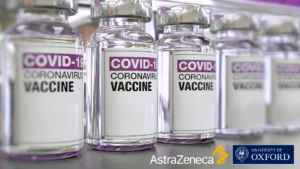-
International Container Terminal Services, Inc. is part of a private sector group that placed an order for over one million doses of COVID-19 vaccine, 50% for use by the group’s essential workers and 50% to be donated to the health department
-
The private sector has committed two million doses of vaccine as contribution to the government’s target of 60 million doses
-
A memorandum of understanding with AstraZeneca and the British government on the procurement of the vaccines will be concluded by month’s end

Port operator International Container Terminal Services, Inc. (ICTSI) is part of a private sector group that has placed an order for COVID-19 vaccines, half of which will be donated to the Department of Health and the other half to private sector workers, including port and logistics stakeholders.
ICTSI executive vice president Christian Gonzalez, in a Malacañang press briefing on November 24, said the order was placed with UK-based biopharmaceutical company AstraZeneca.
“We strongly believe that some of the key essential services members that really made the biggest impact especially at the beginning of the pandemic were [the employees of] Philippine Ports Authority, Bureau of Customs, and other essential frontline port and logistics workers,” Gonzalez pointed out.
The agreement between the private sector, the Philippine government, and AstraZeneca for 2.6 million doses of vaccine was signed on November 27. Private sector representative Joey Concepcion said the vaccines are set to arrive in May or June 2021.
ICTSI chairman and president Enrique Razon, Jr. is part of the private sector group that has placed orders for over one million doses of COVID-19 vaccine through an advance market commitment, with the advance orders assuring funders for the production of the vaccines.
National Task Force Against COVID-19 chief implementer Carlito Galvez, Jr. earlier thanked Razon, and other taipans Lucio Tan, Ramon Ang, the Sy siblings, and Presidential Adviser for Entrepreneurship Joey Concepcion for placing the vaccine orders.
Gonzalez explained the tri-party agreement involves the private sector shouldering the cost “not only of the 50% deposit for the AstraZeneca vaccine but likewise the remaining 50% once the vaccine is there which is expected now to be some time in the second quarter of 2021.”
Gonzalez said that under the guidelines, 50% of the vaccine will be purely for the use of the Department of Health, and the rest to be determined by the private sector.
He said the private sector has committed two million doses of vaccine, which will be part of the government’s target of 60 million doses.
Galvez earlier said they expect a memorandum of understanding for the advance purchase of 20 million doses of vaccine with AstraZeneca and the British government to be concluded by the end of the month.
If the agreement pushes through, Galvez said the British government has committed to send military personnel and logistics staff to help local health officials distribute the drugs by second quarter of 2021.
“It will take six to seven months to produce [our] order,” Galvez said in a separate television interview.
“Kapag magkaroon tayo ng signing of contract this November and December, ang pinaka latest na i-deliver sa atin [‘yung vaccines] ay June or July,” he added. [If we sign the contract this November and December, the latest the vaccines can be delivered to us is June or July.]
The vaccine candidate of AstraZeneca, developed in partnership with the Oxford University, has shown an overall effectiveness of 70.4%. The success rate rose to 90% in a group of trial participants who received a half dose followed by a full dose. The efficacy was 62% if the full dose was given twice.
But despite a lower overall effectiveness rate compared to the other vaccine candidates at the interim stage, AstraZeneca’s vaccine candidate has so far been reported to have a good safety record with no serious side effects. The vaccine candidate can be stored in a domestic fridge, as compared to other vaccine candidates that require ultra-low temperatures, which is seen as a challenge for many countries.
Moreover, AstraZeneca has made a “no profit pledge” and its vaccine candidate will be cheaper than other vaccine candidates.
Aside from AstraZeneca, the Philippine government is also in talks with China-based Sinovac and US vaccine manufacturers Pfizer and Johnson & Johnson. – Roumina Pablo
Updated on Nov 27 at 5:17pm to include date of signing of contract.





